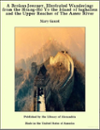'In February 1913, Mary Gaunt (1865–1942), a popular novelist, travel writer, and feminist from colonial Australia, set off on a solitary journey to China with the prospect of writing more books to secure an income (Hickman 180). Crossing the Siberian plain, she was astonished by “the vastness and the beauty”: “Overhead, far, far away, is the great arch of the deep blue sky, clear, bright, enticing, delightful,” she writes, “and below is the snow-clad plain, stretching far as eyes can see, bathed in the brilliant sunshine” (Gaunt, A Woman in China 10). However, physical movement through such an expansive and sublime space does not always lead to new possibilities and exalted states such as freshly-gained freedom, agency, or spiritual transcendence, emotions which have been extensively explored in studies concerning literary representations of female mobility from the eighteenth century to the present.1 On the contrary, for the already troubled female figures long burdened by the plight of womanhood, when they do find the chance to break away from “a woman’s place” – that is, at home, first and foremost (Lawrence x) – by holding a passport for travel otherwise associated with masculinity, emotional sufferings can be generated or sometimes exacerbated during such journeys; these may then impact and sometimes constrain how they perceive themselves and the surrounding world. Gaunt, for example, repeatedly projects her own painful feelings onto the landscape and the people inhabiting that space. It is a “lavish land,” and a “fairyland,” but equally (and this weighs her down) she confronts “a city of silence,” “a land of exile” filled with “sufferings,” “convicts,” “brutal criminals,” and people “whose lives were too strenuous” (Gaunt, A Woman in China 8, 10, 12). Exiling herself from Australia, her hometown, to the metropolitan London, and hence to Africa, and then to China, Gaunt’s border crossing to hunt resources for books transcends many gendered and racialized boundaries as much as it highlights the difficulty of a modern woman with too much self-awareness (Bassnett 242) but with limited economic means (Bird, “Gender” 99).' (Introduction)
 7585728791065274999.jpg
7585728791065274999.jpg
 A Broken Journey: Wanderings from the Hoang-Ho to the Island of Saghalien and the Upper Reaches of the Amur River
single work
travel
A Broken Journey: Wanderings from the Hoang-Ho to the Island of Saghalien and the Upper Reaches of the Amur River
single work
travel

